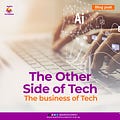In the first quarter of 2023, the Information and Communications Technology (ICT) sector contributed 17.47% to the country's GDP, amounting to ₦3.1 trillion ($6.7 billion), representing a significant increase from the 16.2% ($6.2 billion) recorded in 2022.
Tech in Nigeria is a booming industry, and the reason is not far-fetched; it is one industry where young people in Africa are able to thrive with little or no support from their government. The advent of the tech boom has resulted in a lot of people learning tech skills.
Aspilos Foundation provides free tech upskilling for young people in underserved communities to help them gain skills to participate in the digital economy. However, beyond using tech skills to ensure sustainable livelihood, I’ve come to realise there is another side to tech, which is not seeing tech as a means to gain employment but as a tool to solve everyday problems.
I understand not every problem bedeviling our society has a tech solution; for instance, there is no tech solution for bad roads, at least none that I know of, nor is there a tech solution to increase agricultural crop production. There are problems tech will not solve.
The Elon Musk story
It is one thing to have a tool; it is another thing to know how to use that tool to solve problems and build profitable enterprises out of it.
Let’s travel back to 1995 to see how one of the most celebrated entrepreneurs in the world today, built his first company leveraging on tech as a tool as opposed to settling for Tech jobs.
Upon their recent relocation to the United States from South Africa, young Elon and his brother Kimbal found themselves in Silicon Valley, California. Elon, fueled by his expertise and passion for technology, embarked on internships at various tech startups in the area.
During one of these internships, a sales representative from Yellow Pages, a conventional phone directory company, visited their office. The representative pitched traditional YellowPages advertising along with an online listing, but failed to articulate the benefits of the latter due to a lack of understanding of the internet.
Unlike the salesperson, Elon possessed an in-depth understanding of the internet, nurtured since his youth. At a tender age, he persuaded his father to buy him a computer, delving into the world of programming with fervor. Completing a six-month BASIC programming workbook in just three days and crafting a video game he sold for $500 at the age of 12 underscored his exceptional aptitude.
Observing the salesperson's inadequacy, Elon saw an opportunity. He swiftly contacted his brother Kimbal, and together, they laid the groundwork for the Global Link Information Network, later rebranded as Zip2.
Elon spearheaded the coding efforts while Kimbal focused on sales, leveraging technology from a GPS mapping company and local directories to compile business addresses. This amalgamation formed the cornerstone of Zip2's potential.
In 1999, Zip2 was acquired by Compaq for $307 million, yielding Elon approximately $22 million. This windfall provided the bedrock for his future endeavors in the business realm.
A new Approach to our empowerment programs.
Our Start and Grow initiative is a shining example of how tech can be utilized for social impact and economic empowerment. By providing training and support, this initiative not only equips participants with valuable tech skills but also fosters a mindset shift towards entrepreneurship and innovation.
Through programs like this, individuals are encouraged to see technology not just as a means of gaining employment but as a vehicle for creating sustainable solutions and businesses and to see tech as more than software development.
Breaking into the tech industry can seem daunting, especially for those without a traditional technical background. However, as demonstrated by the Elon brothers, success in tech entrepreneurship is not solely dependent on coding prowess.
Instead, aspiring entrepreneurs should focus on identifying pressing problems within their communities and leveraging technology to address them effectively. This might involve collaborating with technical experts, learning basic coding skills, or simply understanding how to utilize existing tech tools and platforms.
Furthermore, the business of tech extends beyond creating innovative solutions to societal challenges. It also encompasses aspects such as market research, product development, marketing, and sales.
Building a successful tech venture requires a multifaceted approach that combines technical expertise with business acumen. Fortunately, resources and support networks are increasingly available for aspiring tech entrepreneurs, including incubators, accelerators, and mentorship programs.
The other side of tech represents a shift in mindset from viewing technology as merely a means of employment to recognizing its potential as a powerful tool for problem-solving and entrepreneurship. By embracing this perspective, you can harness the transformative power of technology to create positive change in your community and build successful businesses.





